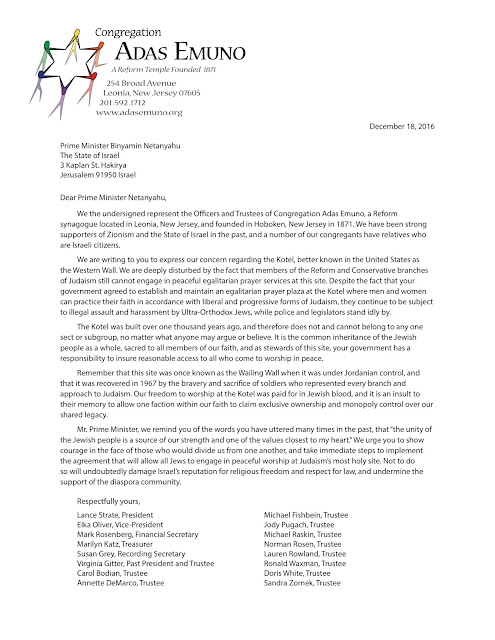On Thursday, February 22nd, Rabbi Schwartz delivered the resolution at a meeting of the town council, and the proceedings were reported in the North Jersey Record, in an article entitled, Leonia Agrees to Vote on 'Welcoming' Resolution. The article featured a photograph of our rabbi reading the resolution to the citizens and officials at the gathering:
The article, written by Michael W. Curley, Jr., begins as follows:
After more than a dozen residents offered their opinions on a proposal for sanctuary city status for the borough, the mayor proposed a resolution he drafted declaring Leonia a "welcoming community."
Residents filled the Borough Council chambers Wednesday night, with some supporting the idea of making Leonia a sanctuary city while others stood against it, two weeks after a resident's letter sparked debate on the subject.
Some were against the status because they believed it asked law enforcement to disregard the laws of the country. Others said the borough is already a sanctuary city in practice, as officers do not ask immigration status, and therefore does not need to make a statement declaring itself a sanctuary city and risk losing federal funds, as per President Trump's executive orders on immigration.
As descendants of legal immigrants, some who spoke Wednesday night said their parents and grandparents went through the long, arduous process of immigration and followed the law, and they urged the council to also follow immigration laws and not grant sanctuary status.
The reporter continues on to depict the meeting as one in which differing views were expressed:
Those in favor of the status urged compassion for the plight of refugees and immigrants, many of whom are fleeing war-torn countries and seeking better lives for themselves and their families, residents said. Some also said the borough needs to make a stand against the president's executive orders.
Still others sought a middle ground between that compassion and ensuring that criminals do not find refuge in the borough and put residents at risk, suggesting the borough work with foreign embassies to identify such criminals.
Mayor Judah Zeigler said he appreciated the large turnout and the diversity of opinion, adding that it is a "complicated issue." He distributed his draft to the council, and proposed that it be put on the consent agenda at the next meeting.
The mayor's resolution advocates the borough's values and asserts that law enforcement officers shall not inquire about the immigration status of residents who are not being arrested for a crime, but does not include the language "sanctuary city."
Zeigler said the resolution expresses his commitment to diversity and protecting the municipality's character as a diverse community.
Compared to the interfaith clergy's resolution, Zeigler's compromise amounts to a much weaker statement, and comes as something of a disappointment to those advocating for sanctuary city status (although the specific provisions on the sanctuary city resolution are not as strong as New York City's, and stipulate that officers of the law and government officials should not act in an illegal fashion).
The article continues:
Councilman William Ziegler thanked the mayor for drafting the resolution for discussion, and said that since the previous meeting, he had done research. He said he found that residing in the country without documentation is not, in itself, a crime.
"We can't dispute that we're a nation of immigrants," he said. "We're stronger, better, safer and more competitive as a nation because we have a healthy immigrant pipeline."
He said there would be "severe" repercussions to deporting illegal immigrants, as they pay taxes and have jobs, in addition to the pain to families pulled apart by deportation, but added there is a need to be prudent as to the security of the country.
"We don't want to overreach in the name of security at the expense of sacrificing our values," he said, citing statistics that say an American is as likely to be killed by a foreigner as by a shark, and according to the Cato Institute, the odds of being killed by a refugee are one in 3.64 billion.
He urged that the council go on record as respecting immigrant rights while also participating in criminal investigations, as is the government's responsibility.
Councilwoman Bernadette Flaim said the council should take a stand and commended the mayor for the resolution, which she said represents what the borough is and sets it apart from the negativity surrounding the issue.
Council President Maureen Davis-Havlusch said the borough gains something with the resolution as the mayor proposed, but loses nothing, as it does not limit the police in the case of criminal investigations. She added that there is a difference between civil and criminal law, as people are not asked their immigrant status in civil matters, but they are asked in criminal ones.
Councilman Pasquale Fusco dissented, saying he finds the town welcoming, and as the police already do not profile or ask immigration status, the resolution is not necessary.
After the council's discussion, many in the audience said they appreciated the draft. Resident Leah Roland, who wrote the letter to the council that sparked the debate two weeks ago, said the resolution "reflects the spirit" of the borough.
Some still opposed the resolution, while others said they had hoped the council would go further in making a stand on the topic. Still others found the mayor's draft to strike a good balance between the two sides of the issue, affirming Leonia's diversity and welcoming nature without jeopardizing its federal grant funding by using the "sanctuary city" language.
The council is set to vote on the resolution at its next meeting, on March 6.
We certainly agree that the mayor's resolution is a step in the right direction, and better than no statement at all, and that it would be even more disappointing should even that lukewarm measure fail to pass. Leonia has a storied history as a town of intellectual and artistic distinction, and we hope its current leadership lives up to its legacy.













.JPG)





